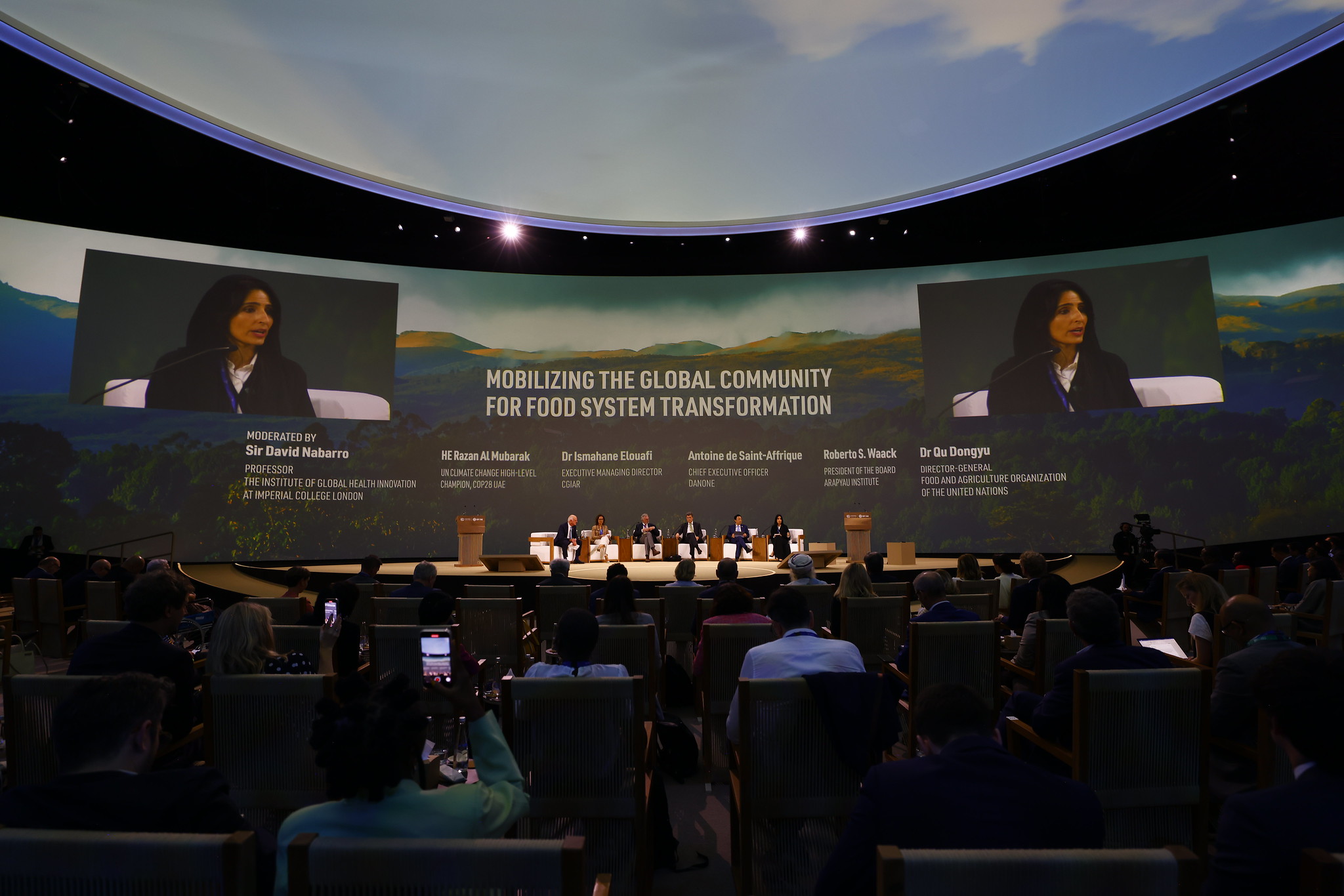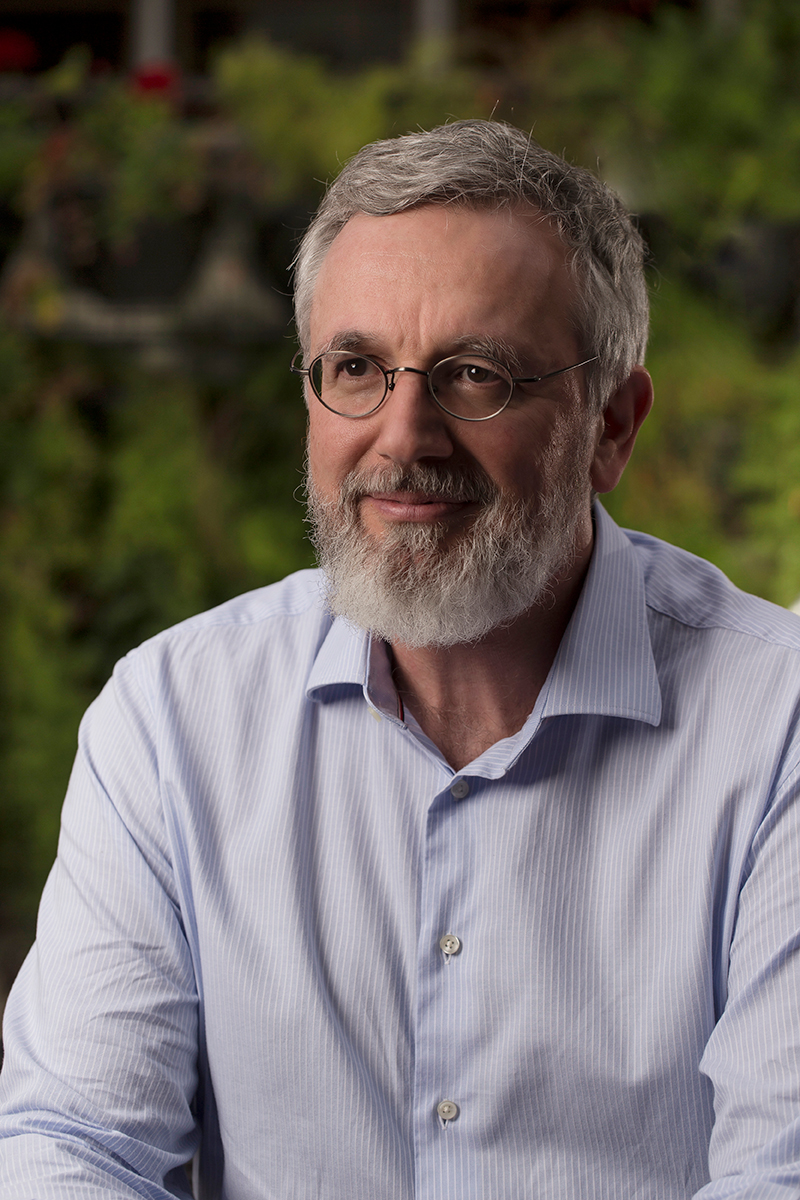Article originally published on the Chatham House website on December 13th, 2023
Ana Yang and Roberto Waack*
The United Arab Emirates’ COP presidency has successfully moved food system transformation firmly onto the global climate change agenda.
A new US–UAE fund, pledging $17 billion to support low carbon food system practices, and initiatives such as the Alliance of Champions for Food System Transformation (with Brazil as co-chair), are important signals that governments and non-state actors recognize the speed and scale required to deliver both climate and biodiversity objectives.
A new report by the UN Food and Agriculture Organization (FAO), the Global Roadmap for food system transition, offers a clear vision for countries to adopt in this global effort.
The problem is serious and urgent. Food systems are responsible for about a third of global greenhouse gas emissions, through indirect emissions from deforestation driven by food production and through direct emissions caused by practices such as cattle farming, rice production and fertilizer use.
At the same time, food systems are vulnerable to direct impacts of climate change, threatening serious effects on crop yields.
There is a need for structural transformation of food systems production practices to mitigate emissions, while increasing resilience to climate impacts – highlighting the need for improved practices in nature protection, natural resource management (including soil and water); livestock and crop management; integration between production and processing (to reduce food loss); and in consumption habits.
Over the next two years, Brazil has a critical window of opportunity to drive this global transformation, through its presidency of G20 in 2024 and of the COP30 climate conference in 2025.
Brazil as G20 president
Brazil is a global agriculture powerhouse, leading on production of sugar, coffee, soybeans, beef and orange juice production.
The agrifood sector is responsible for 24.4 per cent of the country’s GDP in 2023, but contributes around two thirds of the country’s GHG emissions: half derive from deforestation driven by agriculture activities and the other half from methane and nitrous oxide from cattle and fertilizer use.
As G20 president in 2024, Brazil will be pivotal in defining the shape and pace of food systems transformation and how food, nature and economy intersect. To ensure its credibility in this role, Brazil will need to define how it will transform its current agrifood system into one that does not encroach on nature and forests, based instead on the multiple uses of land, with integrated cattle, crop and forest systems, and the restoration of degraded pastureland into forest.
Importantly, it will need to fully account for the needs of the 4 million smallholders and family farms, (equivalent to 77 per cent of total producers) in any transition plan.
This will not be an easy task. Lula’s electoral flagship commitments relate to food insecurity, with his Brazil Without Hunger programme, launched in August, to deliver measures across food security, social assistance and healthcare to reduce hunger.
Balancing such important projects with the urgent need for agroeconomic transition will offer both opportunities and serious challenges relating to delivering a just transition.
Structural transformation of Brazil’s food system
Currently, Brazil’s regulatory systems (such as the National System for Conservation and the Forest Code) are relatively progressive and ensure the protection of nature.
With effective implementation of command-and-control actions, Lula’s government managed to reduce the deforestation rate by 22 per cent in 2023 in the Brazilian Amazon, although it continues to grow in biomes such as Cerrado, a key agriculture expansion frontier, due to lack of economic incentives and change in land use practices.
One of Brazil’s key barriers to protecting nature is difficulties mobilizing private and public funding. Relying on voluntary ecosystem credits will not be enough for the scale and speed required for the transformation.
Only structural transformation of the current agrifood production system, into a new type of bio-based economic system that connects nature, forests and food will be sufficient.
This includes embedding the protection and restoration of nature into economic incentives for land owners.
Cashflow should be diversified and derived from the multiple uses of land. This includes nature finance and ecosystem credits, and cashflows from the production of forest products, food and feedstock.
This will ensure guaranteed income for nature and forest preservation, as well as for crop production and cattle farming.
Different stakeholders in Brazil have already initiated pilots and partnerships in this area, and many of the side events hosted by Brazilian institutions at COP 28 presented ideas around nature, finance, bioeconomy and transformation of the food sector.
The launch of the National Bioeconomy Policy, plus commitments of public funding from the Brazilian National Development Bank (BNDES), and research support from Embrapa (Brazil’s state-owned agriculture research enterprise), are important enabling capabilities and send a political signal.
Private sector initiatives such as Re.Green, a restoration fund and Biomas, a consortium between banks, forest pulp and paper players and food producers are also examples of private sector partnerships that can also connect forest, food and bioeconomy.
These initiatives can build on the existing debate in Brazil about bioeconomy and food transformation, as illustrated by the example of Uma Concertacao pela Amazonia (but most of the conversation is restricted around production).
Seizing the opportunity
With resource demand set to rise globally, a biobased economy that embeds circularity and decarbonizes food, energy and material systems swiftly will be critical to meeting both COP climate and biodiversity commitments.
Brazil is in a strong position to energize this agenda and enlist a large number of global economies in its realization.
If the country can show real progress as G20 president, it can take up its 2025 COP presidency with the authority and credibility to quicken the pace of the sprint still further.
It will not be easy. Multiple avenues exist for transformation, both at the small scale and across global supply chains. Government ministries will need to coordinate their policy design and implementation to deliver social and environmental outcomes. Food system stakeholders will need to overcome ideological differences to agree how an efficient transition takes shape – and all in a rapidly closing window of opportunity.
*Ana Yang – Executive Director, Sustainability Accelerator, Environment and Society Centre
Roberto Waack – Associate Fellow, Sustainability Accelerator, Environment and Society Centre
[Photo: COP28 UAE/Flickr]


